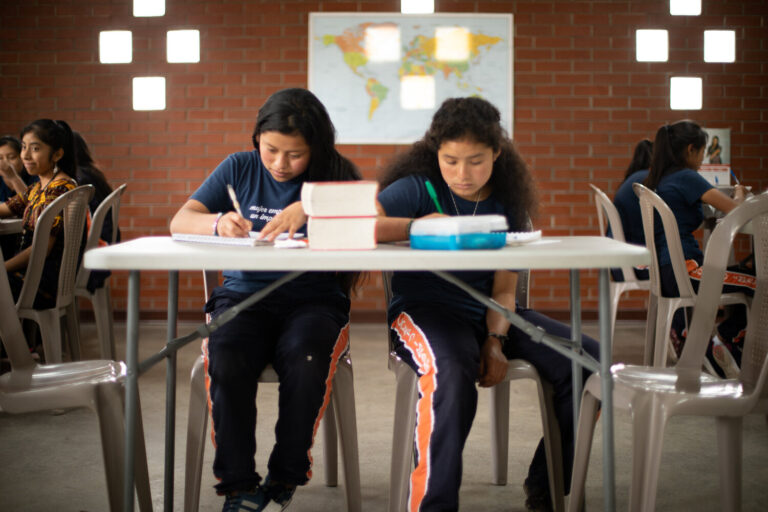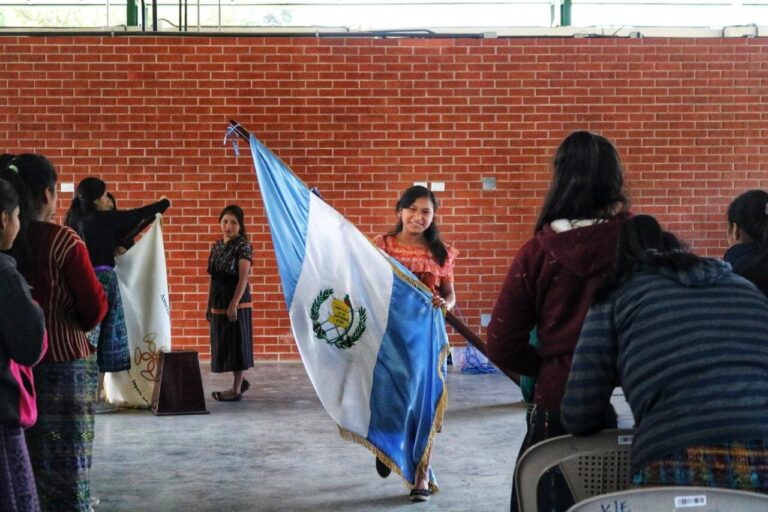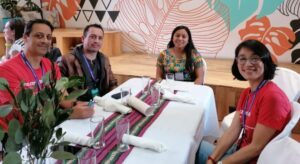
Transforming Futures: Amelia’s Story
Amelia was shy and reserved, but everything changed when she joined the MAIA Impact School. She broke the cycle and became the first daughter in her family to continue her

The MAIA and Girl Pioneers’ story
While reflecting on the results of the 2019 Guatemalan presidential elections, the theme of representation is an important one to consider. On the national stage, Guatemalan politics is and has been male-dominated and typically excludes indigenous communities. But at the MAIA Impact School, Girl Pioneers are surrounded by female role models every day and are pushed to use their voices and become leaders. What do Girl Pioneers think about the lack of indigenous female representation on the national stage? How do they see their role in local and national politics? Today we hear from the four presidential candidates who ran for MAIA’s first student government.

Norma: It’s important to have a leader, someone who can represent the voice of those who aren’t able to speak out. And it’s not just because you are a leader that you become everyone’s boss; it’s important to work with people from distinct backgrounds. A boss is someone who gives orders; a leader leads by example through their actions, and this is an essential trait for a presidential candidate.
Claudia Marisol: I agree with Norma. It’s very important for a student president to show up as a leader. Not everyone has the capacity to be a leader, and those who do have to speak up for their colleagues. This is also a learning experience for us to expand our knowledge and skills. By running for student government, we practice vocal empowerment and public speaking.
Yessica Maria: The voice of a leader is important because you can represent the voices of others, be a source of communication and expression for the rest of our colleagues.
Marlin: I believe this student government activity was important for students to learn how students express themselves as a political party and whether we have any similarity to politics in Guatemala City. For example, if a student president is just trying to benefit her immediate friends, then we can see some similar issues to corrupt political parties on a national level. It was important that during elections we stood by our values and proposals and that is how our student government president was elected—through honest and fair competition.

Yessica Maria: I see these as very different. Women from rural areas work in agriculture and work in the fields. Meanwhile, women in an urban setting work in offices and don’t understand the reality in rural areas.
Marlin: I agree that it would be very different. In urban areas, people have very different jobs than those we have in rural areas. If a woman is elected in a city, she will try to raise the minimum wage, which will impact women employed in offices or homes in the city. In contrast, women in rural areas who work selling fruit they harvest and don’t have a fixed income or an employer are not taken into account with an increased minimum wage. What happens if one year’s harvest does not produce enough fruit? This is why it’s important to have an indigenous woman in power; she will take these hardships into account during her presidency.
Claudia Marisol: A leader from rural areas will better understand the economy in her region and use this knowledge to create policies that will benefit those who spend all day under the sun working in the fields.
Yessica Maria: I would like to thank the MAIA Impact School because they have taught us to use our voices and to speak in public. The skills we have gained are tools we have to succeed. We know the school will help us reach our dreams and create change in Sololá and in Guatemala as a whole.
Norma: I’d like to add that everyone has a unique characteristic, and we are all able to be leaders. We are all able to help and to create positive change in the future. You don’t have to be a president. A good leader can be a teacher who can create change for their students, an accountant who can administer finances honestly and with integrity, or a businesswoman who can produce well-made, high-quality goods to support her community. It’s important for both men and women to have a voice and vote.
Marlin: It’s also important to elect candidates we believe in, not someone who will sell us lies or short-term solutions, but someone who will really create positive change for our communities.
Claudia Marisol: It’s important for students, children, and women to be a driving force for change. Women are empowered to make their own decisions, and they are able to change the world and their communities. We have a voice and vote and should exercise this right.
This month, Guatemalans elected Giammattei, a right-wing male candidate, showing a commitment to the status quo in the national political setting. Girl Pioneers are taught critical thinking, and they are ready to become a new generation of leaders who will question the norm in regional and national politics. After graduating from MAIA’s Mentorship Program, 62% of participants are part of a community project, and 58% of participants hold a formal leadership position within an organization. MAIA’s empowerment methodology is applied in the same way Norma described leadership—through actions. Educators are from the same communities the Girl Pioneers come from; they are resilient, empowered, and highly trained professionals. They are teaching MAIA’s students what change looks like.
Norma won the student government elections and is the new student body president of the MAIA Impact School. She and the rest of her team meet with Vilma, Director of the Impact School Middle School, and discuss their plans and actions on a weekly basis. Norma ran on a platform that proposed unity, teamwork, and inclusion with the student body. She proposed a reading day when students dress as their favorite literary characters and share their favorite books, and that students get more involved with the Zayed garden sustainability project so that they can work and help the MAIA Impact School develop medicinal and vegetable gardens.

Amelia was shy and reserved, but everything changed when she joined the MAIA Impact School. She broke the cycle and became the first daughter in her family to continue her

Lucero and Wendy, Girl Pioneers of the MAIA Impact School, participated as guest speakers at the 2023 Central America Leadership Initiative (CALI) Regional event.
They are demonstrating that increasing women’s leadership

María Florinda represents MAIA in an event with former First Lady of the United States and Founder of the Obama Foundation’s Girls Opportunity Alliance, in New York on October 25.

MAIA USA
Tax Identification Number (EIN) 68-0652444
Asociación MAIA
Tax Identification Number (NIT) 6896913-9.
Guatemala Office:
Km. 137, Caserío Xolbé,
Cantón El Tablón, Sololá, Guatemala
US Office:
1031 33rd Street, Denver, CO 80205